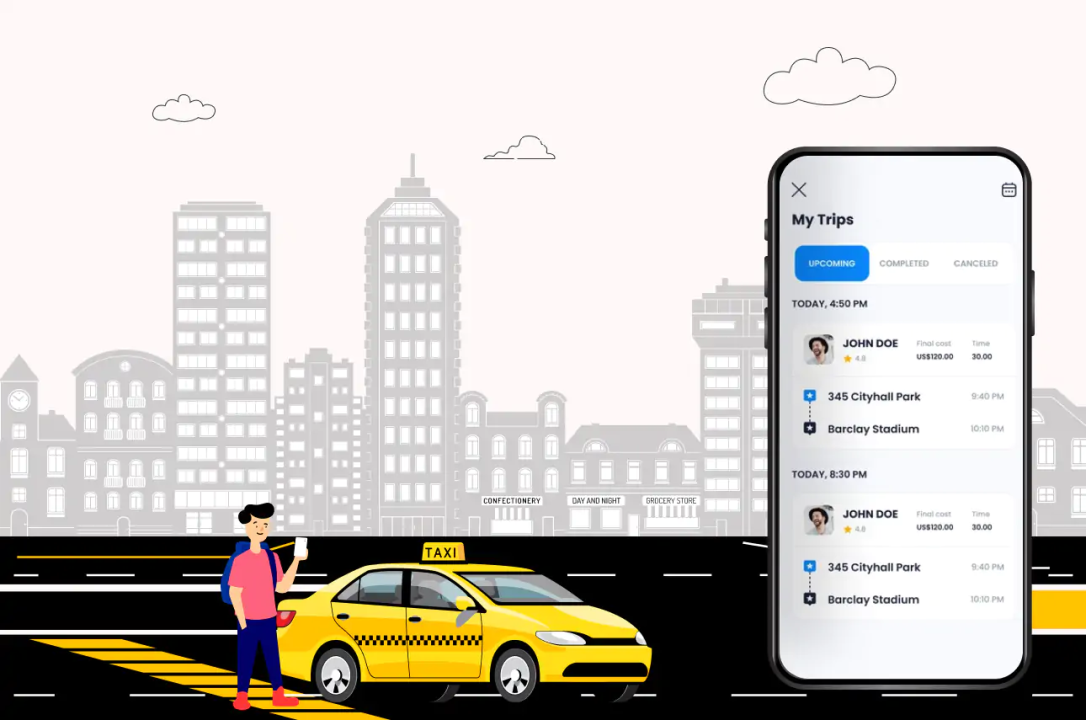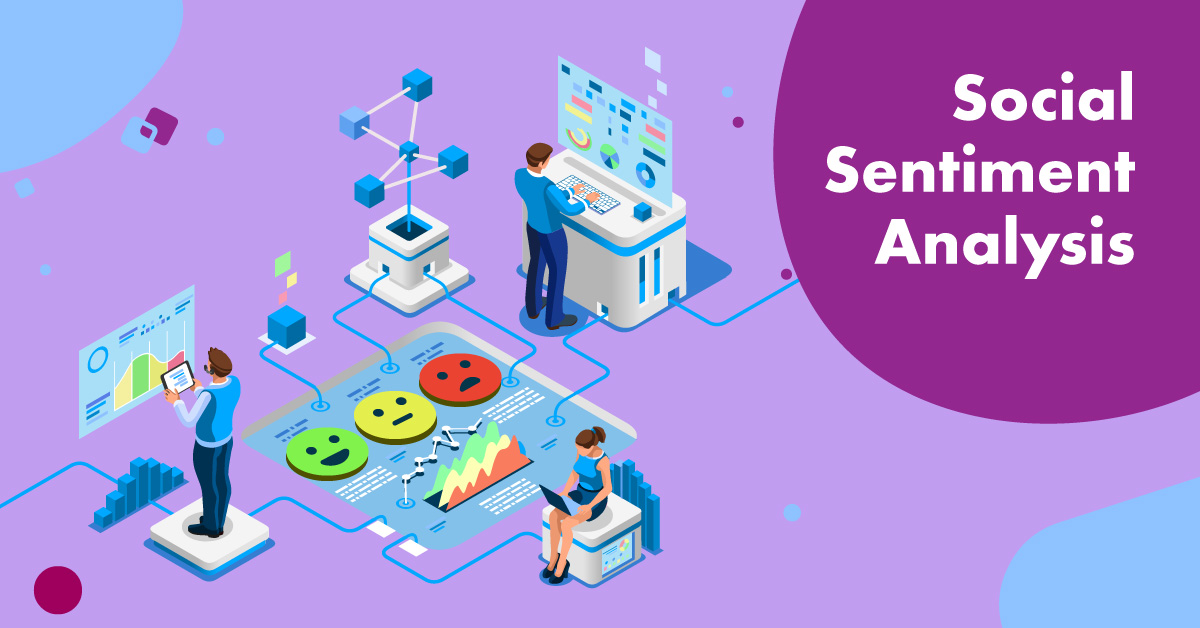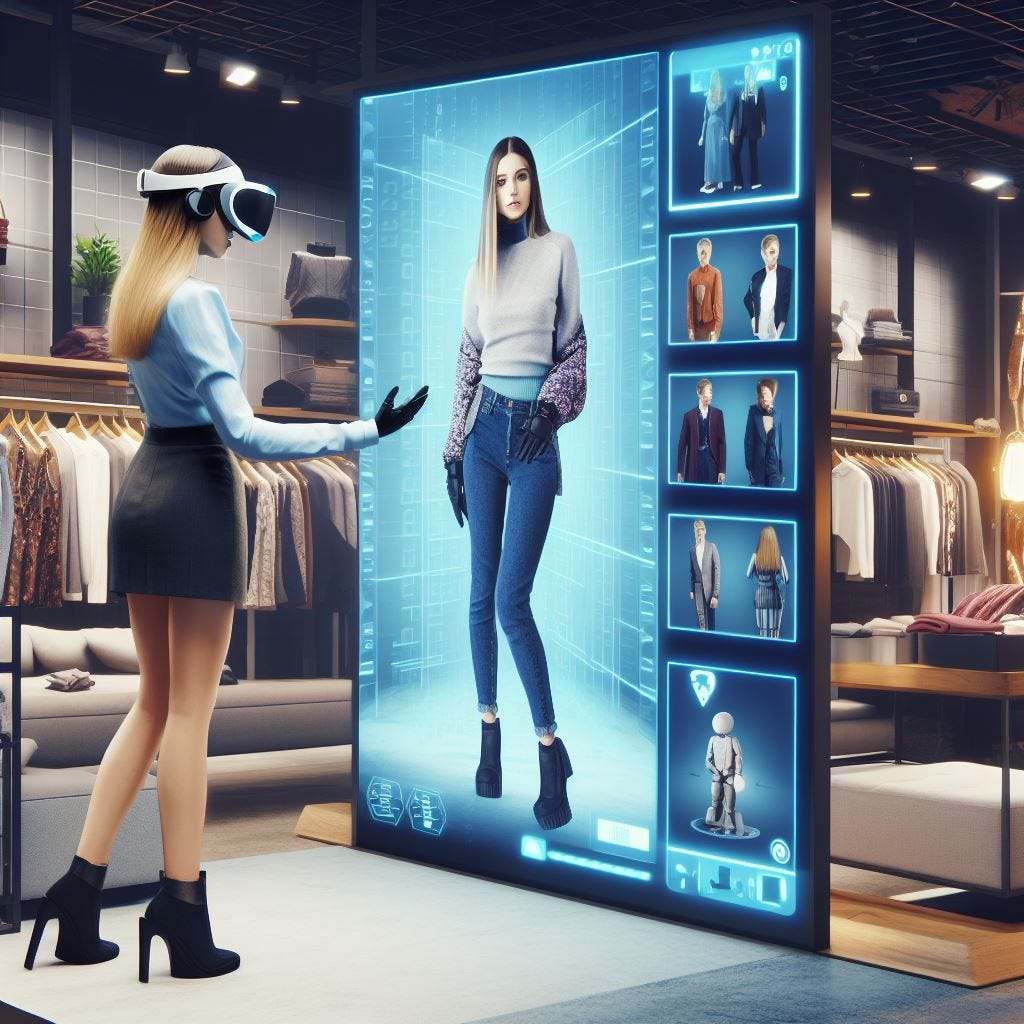Artificial Intelligence (AI) plays a vital role in today’s mobile app development industry. This advanced technology not only enables mobile app developers to build innovative applications but also enhances the services offered. AI is frequently employed in the transportation services industry to simplify complex and time-consuming processes.
According to Business of Apps, “The taxi app market is projected to reach a substantial size of $283 billion by 2028, exhibiting a robust compound annual growth rate (CAGR) of 4.2% over the period spanning from 2023 to 2028.”
The integration of AI in taxi booking apps isn’t just an innovation; it’s a commitment to staying at the forefront of technological advancements, ensuring that our service remains synonymous with reliability, efficiency, and customer-centricity in an ever-evolving industry.
Modern taxi apps incorporate the latest technologies like AI to help users stay updated and responsive. This means users can take full advantage of these taxi services to keep up with contemporary life. Nowadays, AI-powered taxi apps open up new opportunities for providers to attract and retain customers. AI serves as a bridge, making it easier to manage and support various business tasks while understanding human behavior. If you run an on-demand taxi business and seek efficient operations, then this blog is for you.
How AI is Reshaping the Future of Ride-Hailing Services?
AI is undoubtedly reshaping the future of ride-hailing services in exciting ways, bringing benefits to both users and drivers. Here are some key areas where AI is making a difference:
1. Improved Efficiency and Convenience:
- Dynamic Route Optimization: AI algorithms analyze real-time traffic data, weather conditions, and historical trends to calculate the fastest and most efficient routes for drivers, saving time and fuel for both drivers and passengers.
- Surge Pricing Management: AI can predict periods of high demand and adjust pricing accordingly, ensuring fairer prices for users and preventing sudden surges that deter users.
- Personalized Experience: AI can learn user preferences like preferred vehicle types, music genres, and temperature settings, customizing the ride experience for individual comfort.
2. Enhanced Safety and Security:
Predictive Maintenance: AI algorithms can analyze vehicle data to predict potential mechanical failures, allowing preventive maintenance and reducing the risk of breakdowns.
Driver Monitoring: AI can monitor driver behavior like speed, braking patterns, and adherence to traffic rules, promoting safe driving and deterring potential violations.
Fraud Detection: AI can analyze booking patterns and identify suspicious activity, helping to prevent fraudulent bookings and payments.
3. Future-Proofing the Industry:
- Autonomous Vehicles: AI plays a crucial role in the development and integration of autonomous vehicles, which have the potential to revolutionize the industry by offering self-driving taxis in the future.
- Multimodal Integration: AI can connect ride-hailing services with other forms of transportation like public bicycles and scooters, offering seamless multimodal journeys for users.
- Sustainability: AI can optimize routes and vehicle usage to reduce emissions and fuel consumption, contributing to a more sustainable transportation ecosystem.
Benefits of Integrating AI in Your Taxi Booking App
Before unlocking the future of transportation, the benefits of developing a taxi app in USA, UK, Canada, and Australia are plentiful. From improved efficiency to enhanced user experiences, here are some key advantages:
- Smarter Business Choices: AI technology analyzes customer data, helping operators make informed decisions and offering user recommendations. This boosts revenue for on-demand services.
- Personalized Recommendations: AI can analyze user preferences, past travel patterns, and current locations to provide personalized recommendations for ride options, pickup locations, and destinations. This improves the user experience and enhances service.
- App Improvement Insights: Building a successful taxi booking app hinges on understanding users’ preferences. AI-powered taxi app development enables collaboration with various social media platforms, forums, and messaging services, providing comprehensive data for evaluating and improving your application further.
Ways to Integrate AI in Your Taxi Booking App
Artificial intelligence in ride-hailing apps can significantly improve the user experience and help uplift your business by increasing efficiency, safety, and customer satisfaction. Here are several ways to integrate AI into your taxi booking app:
• Predictive Analytics for Demand Forecasting
Predictive analytics leverages historical data and machine learning models to accurately forecast high-demand areas and peak times for taxi services. This enables drivers to strategically position themselves, reducing passenger waiting times.
• Route Optimization
Implementing AI-powered ride-hailing software can factor in real-time traffic, road closures, and various conditions to calculate the most efficient routes for drivers. This not only saves time but also reduces fuel costs.
• Chatbots and Virtual Assistants
Seamlessly integrate chatbots and virtual assistants to provide instant customer support, handle common inquiries, facilitate booking requests, and keep users updated on ride statuses for a smoother service experience.
• Driver Allocation
Leverage AI algorithms to match passenger requests with the nearest available drivers, ensuring swift pickups and optimizing fleet management for improved efficiency.
• Accurate ETAs (Estimated Time of Arrival)
AI can predict ETAs with greater precision by considering factors like traffic congestion, weather conditions, and driver availability. This ensures that passengers have realistic expectations and can plan their trips accordingly.
• Dynamic Pricing
An on-demand taxi business can implement dynamic pricing algorithms to adjust fares based on real-time supply and demand. This can help balance the number of available drivers and passenger requests during peak hours.
• Safety Features
Integrate AI-driven safety features like driver behavior monitoring and passenger authentication to enhance the overall safety of the service.
• Voice Recognition
Enable voice recognition for booking requests and other interactions with the app, making it more user-friendly and convenient.
• Automated Payments
Implement AI-driven payment processing to streamline transactions, enhance security by preventing fraud, and offer users a variety of payment options, making the payment process more convenient.
• Language Translation
If your service operates in multiple regions, leverage AI for real-time language translation to facilitate effective communication between drivers and passengers, ensuring a smoother and more inclusive experience.
Estimating the Cost of Developing an AI-Powered Taxi App
When considering the creation of a taxi booking app for your business, it’s crucial to have an understanding of the potential costs involved. The expenses associated with developing a taxi app can vary based on the specific features and functionalities that you want to include. It’s worth noting that several factors, including the app’s complexity, app platforms (Android, ioS, or both) the scale of your operations, the technology stack used, and the development team’s location can impact the final taxi app development cost.
Here is a cost breakdown:
- Basic Application: For a basic version of the app that includes only essential features, the cost could range from $10,000 to $25,000. This cost estimate generally covers the basic functionalities.
- Advanced Application: If you are seeking an advanced app that offers additional features to enhance the user experience, the cost could range from $25,000 to $50,000 or more. Incorporating advanced features will naturally lead to higher development expenses.
Wrapping Up
The future of transportation is set to be revolutionized by AI. Integrating AI into taxi booking apps is not merely an option; it is imperative for businesses seeking to thrive in the competitive landscape. AI’s transformative power can revolutionize the taxi industry, delivering exceptional user experiences, optimizing operational efficiency, and propelling businesses toward unprecedented success. By embracing AI, taxi companies can redefine the future of urban mobility and cement their position as industry leaders.
If you are embarking on taxi app development and wish to leverage AI for your ride-hailing app development, we are experts in crafting personalized apps tailored to your specific business needs. By collaborating with us, you can expect a top-tier mobile app that seamlessly caters to the needs of both drivers and passengers, ensuring the success of your business.
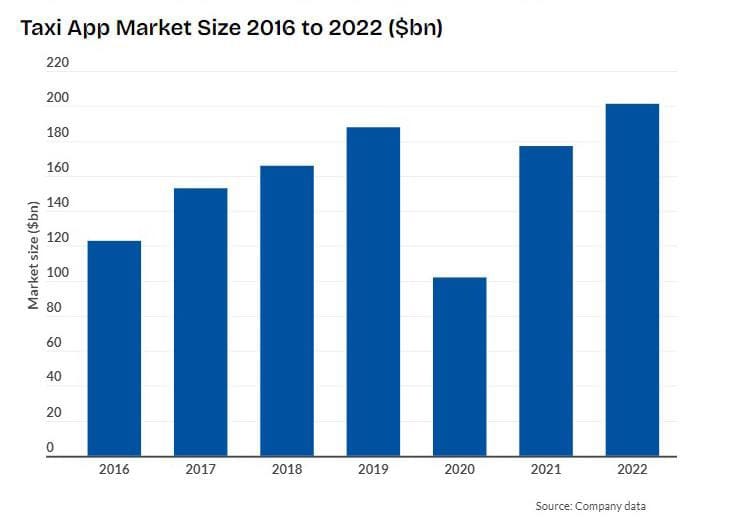
Taxi App Projected Market Size
The taxi app market size is expected to be $283 billion by 2028, at a 4.2% compound annual growth rate during the period between 2023 to 2028.
Taxi App Projected Market Size 2023 to 2028 ($bn)
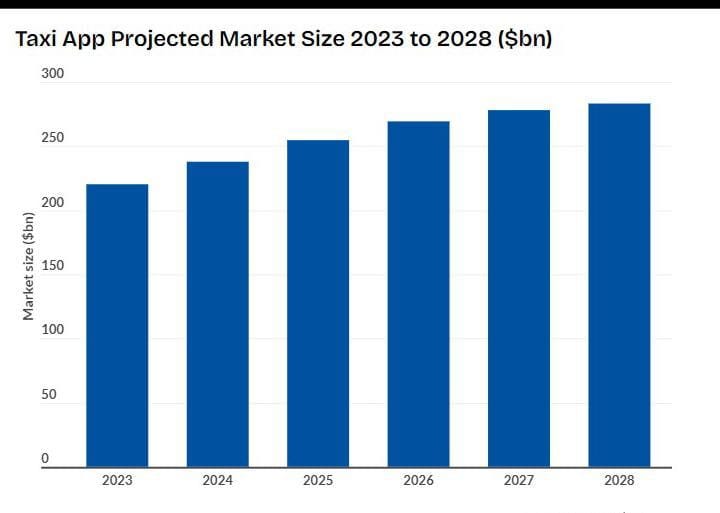
Taxi Revenue by App
Even with the regulatory issues it faced in 2022, DiDi still made the most revenue of any taxi app, at approximately $19.7 billion. Uber came in second place, with its mobility segment generating $14 billion. There’s a large fall off after those two giants.
For more information contact : support@mindnotix.com
Mindnotix Software Development Company


 AI-Taxi App
AI-Taxi App AI-Food App
AI-Food App AI-Property Mgmt App
AI-Property Mgmt App AI-CRM
AI-CRM AI-Fantasy App
AI-Fantasy App
 Web Development
Web Development App Development
App Development Business & Startup
Business & Startup Hire Developer
Hire Developer
 Digital Marketing
Digital Marketing Lead-generation
Lead-generation Creative Agency
Creative Agency Branding Agency
Branding Agency Augmented Reality
Augmented Reality Virtual Reality
Virtual Reality Internet of Things
Internet of Things Artificial Intelligence
Artificial Intelligence Blockchain
Blockchain Chatbot
Chatbot